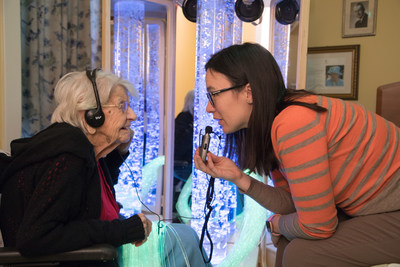New results: Province-wide expansion of innovative program helps improve lives of New Brunswick seniors living with dementia
FREDERICTON, Feb. 5, 2019 /CNW/ - Today, the Canadian Foundation for Healthcare Improvement (CFHI), the New Brunswick Association of Nursing Homes (NBANH) and Government of New Brunswick have announced results of a successful province-wide expansion of person-centred dementia care to all 68 nursing homes organizations in New Brunswick. Over the two phases of the program, more than half of participating residents who were prescribed antipsychotics without a diagnosis of psychosis had these medications safely reduced or discontinued.

Through the New Brunswick Appropriate Use of Antipsychotics (AUA) Collaborative, which began in May 2016, nursing home staff identified residents who could benefit from non-drug therapies to treat symptoms related to dementia. Using a person-centred approach to care, staff engaged residents and their families in developing approaches to care that reflect the resident's preferences and that ensure the resident feels safe and comfortable. This included offering therapies and recreational activities that are meaningful and enjoyable, like exercise, pet or music therapy.
Final results of the initiative included:
- 52 percent of residents who were prescribed antipsychotic medication but did not have a psychosis diagnosis* had their medication reduced or discontinued (34 percent discontinued, and 18 percent reduced dose) and,
- No increase in aggressive behaviours among these residents, such as resistance to care, and physically or verbally abusive behaviours.
Over half a million Canadians live with dementia, with 25,000 new cases diagnosed every year. Antipsychotic medications are often prescribed to help manage symptoms related to dementia, such as agitation and aggression. However, there is a lack of evidence to support their effectiveness for this purpose and a risk that they can cause significant side effects such as confusion, dizziness and stroke. By reducing the inappropriate use antipsychotics, residents in long term care tend to be better able to eat independently, and are more wakeful, which benefits residents, families, and staff.
Rates of potentially inappropriate antipsychotic use to manage symptoms of dementia continue to fall across Canada thanks to the efforts of providers, provincial health quality councils, associations, governments and many others in New Brunswick and elsewhere who are expanding appropriate use of antipsychotics programs. In 2013-2014, about 1 in 3 (30 percent) long term care residents who did not have a psychosis diagnosis was prescribed an antipsychotic. By 2017-2018, that number had dropped to 1 in 5 (21 percent).
*Of those still participating in the program at the end of Phase 1 and Phase 2.
Since 2014, CFHI has supported 191 long term care organizations from across Canada to improve the appropriate use of antipsychotic medication and the quality of life for residents through a pan-Canadian collaboration, as well as major provincial scale collaborations in New Brunswick, Quebec, Newfoundland and Labrador, and Prince Edward Island.
Quick facts
- 84 percent of program participants had Alzheimer's or other dementia
- 62 per cent of residents were female and 38 percent were male
- The average age of participating residents was 85
Quotes
"The Government of Canada is pleased to support CFHI's evidence-based approach to ensuring the appropriate use of prescription antipsychotic drugs for seniors, especially those living in nursing homes," said the Honourable Ginette Petitpas Taylor, federal Minister of Health. "This innovative program demonstrates how focusing on person-centered care can improve the lives of Canadians with dementia, as well as the lives of their families and loved ones."
"We're delighted to celebrate New Brunswick's leadership in improving care of people living with dementia. Residents, along with their families, nursing home staff, and other partners are working together to spread proven approaches to care that promote appropriate medication use," said Jennifer Zelmer, President and CEO of CFHI. "The results show clearly that these efforts are improving care and quality of life in nursing homes across the province."
"We are extremely pleased to have played a supporting role with CFHI and the Government of New Brunswick in bringing this innovation opportunity to New Brunswick Nursing Homes," said Jodi Hall, Executive Director of the New Brunswick Association of Nursing Homes. "The nursing home teams fully embraced the process for this care improvement, and we congratulate them on their leadership and staff commitment. It is very exciting to see the residents experience an improved quality of life."
For more information: http://www.cfhi-fcass.ca/WhatWeDo/appropriate-use-of-antipsychotics
About the Canadian Foundation for Healthcare Improvement
CFHI works shoulder-to-shoulder with partners to identify proven innovations and accelerate their spread across Canada, improving patient care, the health of everyone in Canada and value-for-money. CFHI is a not-for-profit organization funded by Health Canada. Visit cfhi-fcass.ca for more information.
About the New Brunswick Association of Nursing Homes
Leading excellence in long term care, the mission of the New Brunswick Association of Nursing Homes is to lead member homes through a united voice by advocating excellence in long term care and service delivery in New Brunswick.
The views expressed herein do not necessarily represent the views of Health Canada.
SOURCE Canadian Foundation for Healthcare Improvement
